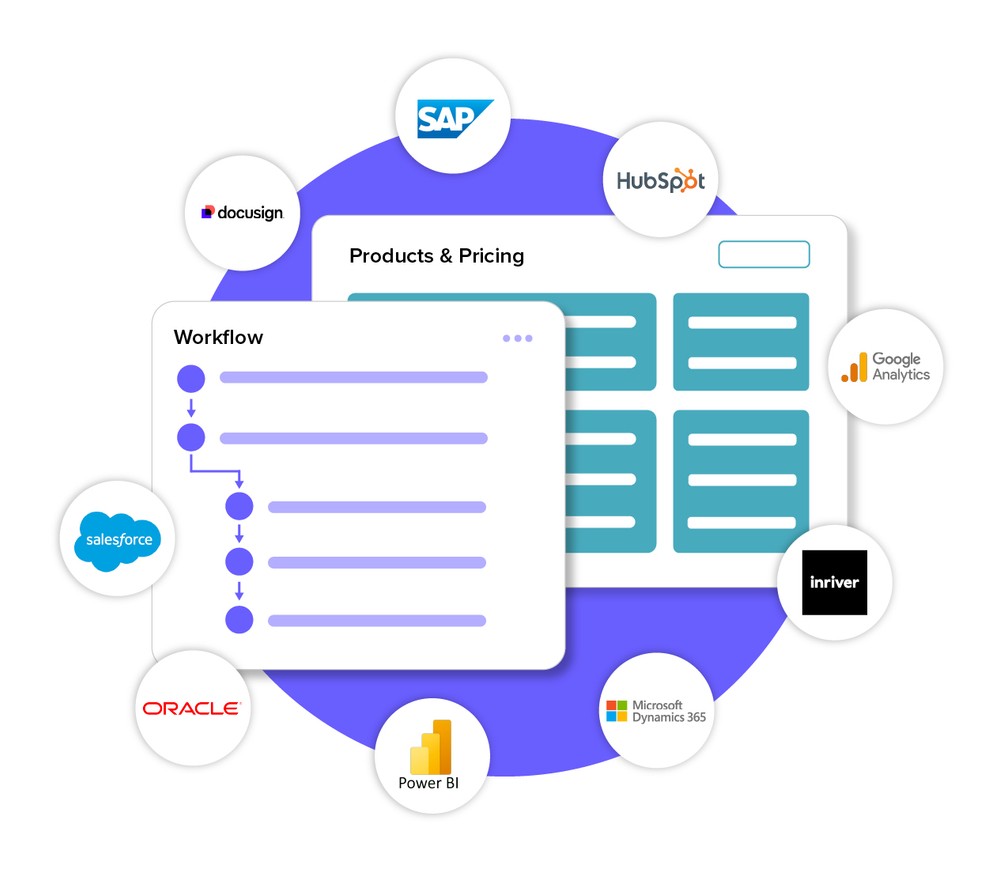In manufacturing, efficiency and collaboration are essential for success. Yet, many manufacturers face challenges when managing disparate systems—CPQ platforms, ERPs, CRMs, PLM, analytics and eCommerce tools that don’t communicate seamlessly. At Tacton, we understand that integration is more than just a technical need—it’s the key to unlocking the full potential of your digital ecosystem.
By enabling seamless connections, manufacturers can transform operations, empower teams, and deliver exceptional customer experiences. Let’s explore how the right integrations inspire agility, productivity, and innovation in manufacturing.
The Power of Connected Systems in Manufacturing
Imagine a manufacturing process where engineering, sales, and operations work in sync. Sales reps configure custom solutions with real-time data from the ERP, engineering teams collaborate effortlessly on updated designs, and operations ensure timely delivery based on accurate supply chain insights. This isn’t just a vision; its what seamless integration enables.
Disconnected systems often lead to:
- Missed Opportunities: Siloed data limits visibility, making it harder to identify customer needs or market trends
- Manual Bottlenecks: Without automation, repetitive tasks like data entry slow down workflows and increase errors
- Inefficient Collaboration: Teams waste time reconciling disparate data, hindering their ability to work efficiently
Connected systems eliminate these barriers, fostering streamlined operations and more strategic decision-making.
Integration in Action: Real-World Scenarios
Seamless integration has the power to revolutionize every aspect of manufacturing, from sales to supply chain management. Here’s how manufacturers are leveraging integration to drive efficiency, accuracy, and innovation:
Optimizing Sales and Quoting
Integrating CPQ systems with ERPs like SAP or Microsoft Dynamics empowers sales teams to provide precise, real-time quotes. Access to accurate inventory levels, lead times, and production costs not only reduces quoting errors but also accelerates order processing, creating a smoother and more reliable customer experience.
Strengthening Customer Relationships
Integrating CPQ with CRM platforms like Salesforce or Oracle empowers manufacturers to deliver personalized customer experiences. Sales teams can access real-time customer insights, such as past purchases, preferences, and open opportunities, directly within the CPQ interface. This integration not only streamlines the sales process but also strengthens customer relationships by providing tailored recommendations and fostering trust.
Enabling Connected Engineering
By linking PLM and PIM systems with CPQ, manufacturers ensure that every configuration is based on the latest product designs and specifications. This reduces costly rework and enhances accuracy, enabling engineering and sales teams to collaborate more effectively.
Enhancing Supply Chain Efficiency
Automated data flows between ERP and supply chain management tools allow manufacturers to quickly adjust to disruptions, such as delays or shortages. With seamless integration, production schedules remain intact, and customer expectations are consistently met.
Simplifying Contracts with CLM Integration
Integrating CPQ with Contract Lifecycle Management (CLM) tools like Docusign or Icertis streamlines the contract process. Quotes and contracts can be sent for e-signatures and securely stored automatically. Additionally, pulling existing agreements into CPQ for new opportunities ensures compliance and reduces the risk of missed details or errors.
Delivering Data-Driven Insights
Connecting BI tools like Power BI or Google Analytics with CPQ and operational systems enables manufacturers to gain actionable insights into production efficiency, customer behavior, and sales trends. These insights drive better forecasting, smarter pricing strategies, and improved resource allocation.
By adopting seamless integration, manufacturers can unlock the potential of their technology stack, fostering collaboration, improving operational efficiency, and delivering exceptional value to customers.
Why Integration Matters More Than Ever
The manufacturing industry is at a turning point. Customer expectations are evolving, supply chains are more dynamic, and the pace of innovation is accelerating. Integration is no longer optional; it’s the foundation of a modern enterprise.
When systems are connected, manufacturers benefit from:
- Improved Collaboration: Teams across departments have access to the same real-time data, fostering better communication and decision-making
- Increased Efficiency: Automation eliminates manual tasks, allowing teams to focus on high-value activities
- Enhanced Agility: Manufacturers can adapt quickly to changing customer demands or supply chain disruptions
Tacton’s Vision for Integration
At Tacton, we understand that every manufacturer’s integration needs are unique. That’s why we’ve designed our integration ecosystem to offer flexibility and scalability. Whether your goal is to connect systems with a no-code platform or leverage robust REST APIs for custom integrations, Tacton CPQ allows you to seamlessly connect on your terms.
This commitment to innovation led to the recent launch of Connect to Anything, our no-code integration platform powered by Workato. With over 600 pre-built connectors, Connect to Anything allows manufacturers to break down silos, synchronize data and automate workflows without needing to rely on extensive IT resources.
Start Your Integration Journey
Integration isn’t just about connecting systems; it’s about enabling growth, innovation, and resilience. With Tacton’s Connect to Anything, manufacturers can move beyond the limitations of fragmented tools and achieve seamless connectivity that drives results.
Learn more about Connect to Anything

